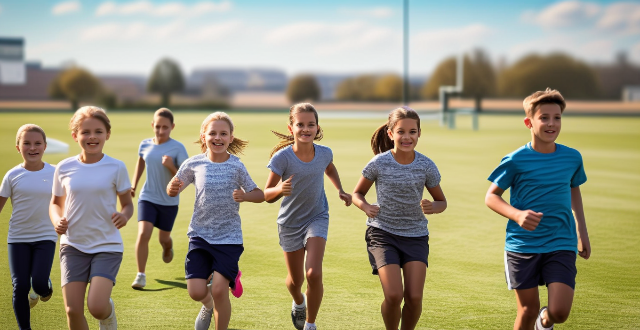Mental Behavior

How does participating in extreme sports affect mental toughness and risk-taking behavior ?
Extreme sports can positively affect mental toughness and risk-taking behavior, helping individuals build resilience and manage risks effectively. However, it is crucial to prioritize safety and recognize personal limitations.

What are some examples of unethical behavior in sports ?
Unethical behavior in sports is a serious issue that can have negative consequences for athletes, teams, and the sport itself. Examples of unethical behavior in sports include cheating, corruption, bullying and harassment, doping, and unsportsmanlike conduct. Cheating can take many forms such as using performance-enhancing drugs or tampering with equipment. Corruption involves dishonest practices such as match-fixing, bribery, and extortion. Bullying and harassment create a toxic environment that can harm the mental health and well-being of athletes and staff members. Doping involves the use of illegal substances or methods to enhance athletic performance. Unsportsmanlike conduct refers to behavior that goes against the spirit of fair play and respect for opponents. Addressing unethical behavior in sports requires education, enforcement of rules and regulations, and strong penalties for those who engage in it.

What are the consequences for athletes who engage in unethical behavior during competitions ?
Consequences for Athletes Engaging in Unethical Behavior during Competitions Athletes who engage in unethical behavior during competitions face a range of consequences that can have significant impacts on their personal and professional lives. These consequences include legal and regulatory sanctions, damaged reputation, lost sponsorships, reduced earning potential, stress and anxiety, social isolation, self-esteem issues, legacy, mental health, and career changes. It is essential for athletes to understand the potential consequences of their actions and strive to maintain ethical behavior at all times.

In what ways do extreme weather events influence human behavior and psychological well-being ?
Extreme weather events, such as hurricanes, floods, heatwaves, and droughts, have significant impacts on human behavior and psychological well-being. These effects can be seen in various aspects of life, including physical health, mental health, social interactions, and economic stability. The physical health impacts include increased risk of injury or death, exacerbation of chronic conditions, and spread of disease. The mental health impacts include acute stress reaction, post-traumatic stress disorder (PTSD), grief and loss. The social interactions impacts include community cohesion and disruption of social networks. The economic stability impacts include financial strain and job loss and unemployment. In conclusion, extreme weather events have far-reaching impacts on human behavior and psychological well-being that extend beyond the initial incident itself. Addressing these challenges requires comprehensive strategies that consider both short-term relief efforts and long-term resilience building measures aimed at enhancing individual, community, and societal adaptive capacities.

How can I train my pet to improve its behavior and obedience ?
Training your pet can strengthen your bond and improve their behavior and obedience. Start with basic commands, use positive reinforcement, be consistent, socialize your pet, address problem behaviors, and practice patience and persistence. Seek professional help if necessary.

How does social media influence consumer behavior ?
Social media has transformed consumer behavior by increasing brand awareness, influencing purchasing habits, and changing perceptions of brands. It enables consumers to compare products, share feedback, and engage with companies directly. Social media also plays a crucial role in product development by providing insights into consumer needs and preferences. Companies can foster customer loyalty through engagement and exclusive deals on these platforms. The rise of social commerce allows for direct purchases within apps and live streaming sales events. Personalization and targeted marketing, including influencer collaborations, further impact consumer choices. Overall, social media's influence on consumer behavior is significant and continues to evolve with technological advancements.

Can sports sponsorship influence consumer purchasing behavior ?
Sports sponsorship is a marketing strategy that aims to increase brand awareness and positively influence consumer attitudes towards the brand. It works by providing increased exposure, building an emotional connection with consumers, enhancing the brand's image, and differentiating from competitors. The impact on consumer purchasing behavior can be direct or indirect, including immediate sales boosts, product trials, brand loyalty, and word of mouth recommendations. Measuring the impact involves analyzing sales data and tracking brand metrics. Success stories like Nike and Michael Jordan and Coca-Cola and Olympic Games demonstrate the potential of sports sponsorship. However, challenges and pitfalls exist, such as misaligned partnerships and overshadowing controversies. In conclusion, sports sponsorship can significantly influence consumer purchasing behavior when executed strategically and appropriately.

What role does environmental psychology play in promoting sustainable behavior ?
This text discusses the role of environmental psychology in promoting sustainable behavior. It highlights key concepts such as perception and cognition, attitudes and values, and behavior change. It also suggests strategies for promoting sustainable behavior, including education and awareness campaigns, community engagement and participation, policy interventions, and technology and innovation. The text concludes that environmental psychology plays a significant role in understanding human perceptions, attitudes, and behaviors related to the environment, and that applying its principles can encourage individuals to adopt sustainable practices and contribute to a more sustainable future.

Is there a link between sedentary lifestyle and increased risk of mental health disorders ?
This article explores the link between sedentary lifestyle and increased risk of mental health disorders such as depression, anxiety, and stress-related disorders. It suggests that lack of exercise can contribute to these issues due to decreased endorphin release and higher cortisol levels. The article recommends increasing physical activity, taking frequent breaks from sitting, and practicing mindfulness and stress-reduction techniques to reduce these risks.

What are the biggest trends in consumer behavior during the Double 11 Shopping Carnival ?
The Double 11 Shopping Carnival, also known as Singles' Day, showcases the latest trends in consumer behavior. Key trends include: 1. **Rise of Mobile Shopping** with increased usage, mobile payments, and social media influence. 2. **Personalization and Customization** through data-driven recommendations, customized products, and interactive experiences. 3. **Omnichannel Retailing** providing integrated experiences, using stores as showrooms, and advanced inventory management. 4. **Sustainable and Eco-friendly Shopping** with a focus on green products, reduced packaging, and promoting the circular economy. 5. **Live Streaming and Influencer Marketing** leveraging live commerce, influencer partnerships, and interactive features. 6. **Data-Driven Decision Making** among consumers using price intelligence, review analysis, and predictive analytics. These trends highlight the impact of technology and changing values on consumer behavior during one of the world's largest shopping events.

How can educational psychology aid in addressing students' mental health issues ?
Educational psychology can aid in addressing students' mental health issues by understanding the role of emotional intelligence, promoting a positive school climate, providing early intervention and support services, encouraging self-care and resilience, and facilitating collaboration between educators and mental health professionals.

What is environmental psychology, and how does it relate to climate issues ?
The topic is about Environmental Psychology, whichThe topic is about Environmental Psychology, which that studies the interrelation which is a branch of psychology that studies the interrelationships between humans and their surroundings. It explores how our physical surroundings influence our thoughts, emotions, behaviors, and well-being. The key concepts in environmental psychology include perception of the environment, cognitive maps, environmental preferences, human behavior in context, restorative environments, and urban design and planning. Environmental psychology relates to climate issues by understanding public perception, promoting pro-environmental behavior, designing sustainable environments, mitigating climate anxiety, and enhancing environmental education. It plays a crucial role in understanding human attitudes, perceptions, and behaviors concerning climate issues. By applying its principles, we can better promote sustainable practices, design supportive environments, and help individuals and communities adapt to the challenges posed by climate change.

What is the importance of mental health in overall personal well-being ?
The text discusses the importance of mental health in overall personal well-being. It explains how good mental health can lead to better physical health, emotional stability, healthy social relationships, workplace productivity, and an improved quality of life. The article emphasizes the need for prioritizing mental health by seeking professional help when needed, practicing self-care, and engaging in activities that promote good mental health.

Are there specific exercises that help improve mental health ?
Exercises like yoga, meditation, aerobic exercise, resistance training, MBSR, and Tai Chi can help improve mental health by reducing stress, anxiety, and depression symptoms while promoting relaxation, self-awareness, and social interaction.

In what ways does poor personal hygiene impact mental health ?
Poor personal hygiene can negatively affect mental health by causing decreased self-esteem, social isolation, and exacerbating symptoms of mental health disorders. It is important to maintain good hygiene habits for overall well-being.

How does climate change affect children's mental wellbeing ?
Climate change has a significant impact on children's mental wellbeing, leading to anxiety, fear, emotional distress, grief, and loss. However, by educating children about the issue, providing access to mental health services, and building strong communities, we can help mitigate these effects and support children's overall wellbeing.

What impact has the pandemic had on mental health and well-being ?
The COVID-19 pandemic has significantly impacted mental health and well-being, leading to increased stress, anxiety, depression, insomnia, and substance misuse. Factors such as fear of infection, financial instability, social isolation, grief, and disruption of daily routines contribute to these issues. The situation emphasizes the need for accessible mental health services and support systems to address psychological needs during this challenging period.

How does nutrition impact women's mental health ?
Nutrition has a significant impact on women's mental health. Eating a balanced diet with adequate amounts of vitamins, minerals, and nutrients can help improve mental health. Avoiding processed foods and sugary drinks, drinking enough water, eating breakfast regularly, and getting enough sleep are also essential for good mental health. By taking care of their bodies through nutrition, women can take care of their minds.

Can physical activity improve mental health ?
Physical activity has been found to significantly improve mental health by enhancing self-efficacy and stress self-management skills. Research shows that engaging in physical activities can lead to a sense of accomplishment, boosting an individual's confidence in their abilities, which in turn fosters better stress management and contributes to enhanced mental well-being. This relationship is particularly important for adolescents, a demographic vulnerable to mental health challenges. Future research should focus on identifying specific types of physical activities that have a greater potential to enhance these skills, guiding the development of targeted interventions aimed at improving mental health through physical activity.

How does exercise improve mental health ?
The article discusses how exercise improves mental health by reducing symptoms of depression and anxiety, improving mood, and enhancing cognitive function. It highlights the release of endorphins, regulation of neurotransmitters, stress reduction, increased energy levels, better sleep quality, enhanced self-esteem, improved memory and attention, reduced risk of cognitive decline, and promotion of neuroplasticity as mechanisms through which exercise positively impacts mental well-being. The conclusion emphasizes the importance of regular physical activity for overall well-being and advises consulting a healthcare professional before starting any new exercise program.

How does climate change impact mental health ?
Climate change has a multifaceted impact on mental health, including direct effects such as trauma from extreme weather events and environmental degradation, and indirect effects like economic strain and social disruption. Mitigating this impact involves raising awareness, strengthening community resilience, investing in mental health services, advocating for policies that address both climate change and public health concerns, and encouraging sustainable practices.

How can schools improve student mental health ?
Improving student mental health is crucial for academic success and overall well-being. Schools can help by creating a supportive environment, implementing mental health programs, providing access to resources, promoting healthy habits, addressing bullying and harassment, offering extracurricular activities, monitoring academic pressure, and encouraging self-care. By implementing these strategies, schools can create an environment that supports the mental health of all students, allowing them to thrive both academically and personally.

How do competitive sports impact mental health ?
Competitive sports have a significant impact on mental health, with both positive and negative effects. Positive effects include increased self-esteem and confidence, improved social skills and teamwork, stress reduction and relaxation, and goal setting and achievement. Negative effects include pressure to perform, fear of injury, burnout and overtraining, and unhealthy weight management practices. It is essential for athletes to manage the pressures associated with competition and prioritize their mental and physical health above all else. Seeking support from coaches, teammates, friends, and family members can also help athletes navigate the challenges of competitive sports and maintain good mental health.

How does exercise contribute to mental rejuvenation ?
Exercise plays a crucial role in mental rejuvenation by releasing endorphins, improving blood flow, enhancing neuroplasticity, reducing stress, improving sleep quality, facilitating social interaction, and boosting self-esteem. Regular physical activity can significantly contribute to improved cognitive functions, emotional stability, and overall mental well-being.

How can mental toughness be developed in athletes through sports psychology ?
The article discusses the importance of mental toughness in sports and how sports psychology can help athletes develop this quality. It outlines six ways that sports psychologists can assist athletes in developing mental toughness, including goal setting, self-talk, visualization techniques, stress management, mindfulness practices, and team building activities. These strategies can enhance resilience, focus, and motivation in athletes, leading to success in their chosen sport.

Is there a connection between procrastination and mental health ?
Procrastination is a common behavior that can have negative consequences on mental health, including increased stress and anxiety, depression, low self-esteem, and poor time management skills. To overcome procrastination, one can set realistic goals, create a schedule, eliminate distractions, use timers, reward themselves, seek support, practice mindfulness, and be kind to themselves.

How do celebrities manage their mental health amidst hectic schedules ?
Managing mental health is crucial for celebrities with hectic schedules, and they employ various strategies to maintain their well-being. These include prioritizing self-care through exercise, healthy eating, and sleep; seeking professional help when needed; setting boundaries to avoid burnout; building a support system of friends, family, and colleagues; engaging in hobbies and interests for stress relief; and practicing mindfulness and meditation to reduce anxiety. By implementing these strategies, celebrities can maintain good mental health and thrive both personally and professionally.

How much exercise is needed to achieve mental rejuvenation ?
Achieving mental rejuvenation through exercise is a widely discussed topic in recent years, and the benefits of physical activity on mental health are well-documented. However, the question remains: how much exercise is actually needed to achieve these benefits? According to the American Heart Association, adults should aim for at least 150 minutes of moderate-intensity aerobic activity or 75 minutes of vigorous-intensity aerobic activity per week. This can be broken down into 30 minutes of exercise, five days a week. In addition to aerobic activity, it's also recommended that adults engage in muscle-strengthening activities at least two days per week. It's important to listen to your body and adjust your exercise routine accordingly. Practical tips for incorporating exercise into your daily routine include starting small, finding an activity you enjoy, making it a part of your routine, mixing it up, and setting realistic goals. By following these guidelines and tips, you can make exercise a regular part of your life and enjoy the many benefits it brings to both your physical and mental health.

How does physical exercise contribute to mental well-being ?
The text discusses how physical exercise contributes to mental well-being by releasing endorphins, boosting self-esteem, improving sleep quality, facilitating social interaction, and enhancing cognitive function. Regular physical activity can lead to long-term improvements in mental health, including reduced stress, anxiety, and depression, as well as better emotional stability and overall mood. Engaging in group sports or exercise classes provides opportunities for social interaction, which is essential for mental well-being, while achieving fitness goals can boost self-esteem and self-confidence. Better sleep patterns from exercise can lead to improved cognitive function and emotional regulation, while enhanced cognition may aid in the management of mental health conditions. Incorporating regular physical activity into your routine can promote mental well-being through these various mechanisms.

What are the benefits of sports for mental health ?
The benefits of sports for mental health are multifaceted and significant, contributing to an individual's overall well-being in numerous ways. The positive impact of physical activity on mental health is well-documented, offering a range of advantages that extend beyond the boundaries of physical fitness. One of the most compelling benefits of engaging in sports is the significant reduction in the risk of depression. Engaging in sports not only aids in combating depression but also helps in reducing anxiety levels. Regular exercise, especially if incorporated as part of a sports routine, can significantly improve sleep patterns. Participating in sports boosts energy levels, making individuals feel more vibrant and alive. Sports provide a platform for individuals to challenge themselves, overcome obstacles, and achieve goals. These experiences can build resilience, an essential trait for maintaining good mental health. Engaging in sports often involves interaction with others, whether as part of a team or through individual competition. This social aspect of sports can provide a sense of community and belonging, which is vital for mental well-being. Through sports participation, individuals can expand their social networks and establish support systems. Having a network of peers who share similar interests and goals can offer emotional and moral support, which is crucial for mental health maintenance. Team sports, in particular, offer opportunities to develop teamwork and communication skills. These skills are transferable to various aspects of life and can enhance interpersonal relationships, contributing to better mental health. Sports provide a structured environment for setting and achieving goals, which can boost self-esteem and a sense of accomplishment. Participating in sports requires discipline and time management, skills that are beneficial both on and off the field. Sports allow individuals to explore their limits and potential, pushing themselves to reach new heights.